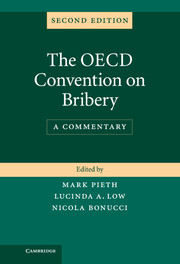Foreword
Published online by Cambridge University Press: 05 March 2015
Summary
The OECD Anti-Bribery Convention is the first and only legally binding instrument to focus on the supply of bribes to foreign public officials. Countries that are party to the Convention must prosecute individuals and companies that offer, promise or give bribes to foreign public officials, and subject those individuals and companies to effective penalties, including heavy fines or even imprisonment.
Parties to the Convention recognise that bribing foreign public officials to win advantages in cross-border business transactions is in no one's interest. They agree to measure themselves against the world's highest and toughest standards for fighting this crime, as well as engaging in a rigorous system of peer review.
The Convention is integral to the OECD’s mission to create a stronger, cleaner and fairer world economy. Since 2006, when I joined the OECD as Secretary-General, the number of Parties to the Convention has grown to include Colombia, Israel, the Russian Federation and South Africa. More countries may join.
The global anti-bribery movement, which truly began with the Convention’s entry into force in 1999, has also grown with the entry into force of the UN Convention Against Corruption (UNCAC) and the adoption of the G20 Anti-Corruption Action Plan in 2010. Both call upon member countries to criminalise foreign bribery.
- Type
- Chapter
- Information
- The OECD Convention on BriberyA Commentary, pp. xi - xiiPublisher: Cambridge University PressPrint publication year: 2013

